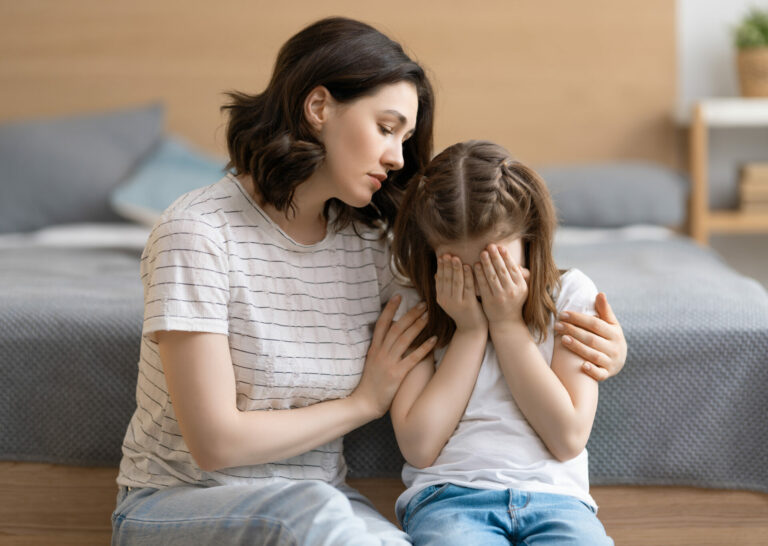Importance of Play When Children are in Survival Mode
By Alex Biddell, BHT | November 10, 2023
When children are in “Survival Mode,” which is the frame of mind for many children who’ve experienced trauma, it can be much more difficult to form trusting relationships with others around them. It affects how they view authority figures in their life such as their parents and potential supports like peers (Wesselman et al., 2014). A major tool to help children jumpstart that relationship-building ability is through play. Play helps kids take control over their trauma, learn how to embrace challenges, and foster caring relationships.
For some, the fact that play can do all of this in children does not make a lot of sense at the beginning. How can having pretend tea parties and playing with action figures be a tool for great healing? The simple answer is that it is their time to learn about their world in the safety of their own personal environment (Wesselman et al., 2014). In this world that they have made, their viewpoints of the world around them come alive. They have freedom to work out their problems and express the emotions felt about them in a nonjudgmental space, and with that freedom, their playtime becomes a testing ground to develop lots of important qualities.
Confidence-building is one such facet of a child’s personality that grows because of play (Wesselman et al., 2014). As they play, children can set up challenges like building a LEGO tower. Once they complete that challenge, they start to realize their agency and build the confidence to complete tasks put in front of them. This confidence begins to lay the foundation for their problem-solving skills as they grow older (Wesselman et al., 2014). Children are building their ability to cooperate and communicate with others through play as well (Wesselman et al., 2014). For instance, two children playing a game together must communicate different things so that they can play according to whatever activity they’ve come up with. Two kids running a race together will usually say where the finish line is before they take off running, for example. That is the beginning of proper communication between children.
So where does trauma fit into all of this? According to Wesselman (et al., 2014a), trauma can affect children’s ability to freely play. If they have no trusted relationships, children won’t feel safe enough to play and express all that they would want to in that space. Some traumas can even affect the brain to the point that some children can’t be imaginative during play. Trauma, as a result, lessens their ability to practice those skills and affects how their brain develops overall. The effects of such trauma can be presented through using toys that are inappropriate for their age such as a 12-year-old pushing a baby’s bubble mower or being much bossier and controlling during play (Wesselman et al., 2014b). Trauma affects how children behave across the board, and their play is no exception.
With all of this in mind, participating in and maintaining healthy play with children is a vital step to helping kids come out of Survival Mode. To do this, parents can help reinstate their children’s sense of security, autonomy, and self-control. As they relearn this ability, they can be set on the path to healing from trauma. But for this to happen, parents must first establish a healthy and playful relationship with their child(ren). This topic will be explored further another time.
When children are in “Survival Mode,” which is the frame of mind for many children who’ve experienced trauma, it can be much more difficult to form trusting relationships with others around them. It affects how they view authority figures in their life such as their parents and potential supports like peers (Wesselman et al., 2014). A major tool to help children jumpstart that relationship-building ability is through play. Play helps kids take control over their trauma, learn how to embrace challenges, and foster caring relationships.
For some, the fact that play can do all of this in children does not make a lot of sense at the beginning. How can having pretend tea parties and playing with action figures be a tool for great healing? The simple answer is that it is their time to learn about their world in the safety of their own personal environment (Wesselman et al., 2014). In this world that they have made, their viewpoints of the world around them come alive. They have freedom to work out their problems and express the emotions felt about them in a nonjudgmental space, and with that freedom, their playtime becomes a testing ground to develop lots of important qualities.
Confidence-building is one such facet of a child’s personality that grows because of play (Wesselman et al., 2014). As they play, children can set up challenges like building a LEGO tower. Once they complete that challenge, they start to realize their agency and build the confidence to complete tasks put in front of them. This confidence begins to lay the foundation for their problem-solving skills as they grow older (Wesselman et al., 2014). Children are building their ability to cooperate and communicate with others through play as well (Wesselman et al., 2014). For instance, two children playing a game together must communicate different things so that they can play according to whatever activity they’ve come up with. Two kids running a race together will usually say where the finish line is before they take off running, for example. That is the beginning of proper communication between children.
So where does trauma fit into all of this? According to Wesselman (et al., 2014a), trauma can affect children’s ability to freely play. If they have no trusted relationships, children won’t feel safe enough to play and express all that they would want to in that space. Some traumas can even affect the brain to the point that some children can’t be imaginative during play. Trauma, as a result, lessens their ability to practice those skills and affects how their brain develops overall. The effects of such trauma can be presented through using toys that are inappropriate for their age such as a 12-year-old pushing a baby’s bubble mower or being much bossier and controlling during play (Wesselman et al., 2014b). Trauma affects how children behave across the board, and their play is no exception.
With all of this in mind, participating in and maintaining healthy play with children is a vital step to helping kids come out of Survival Mode. To do this, parents can help reinstate their children’s sense of security, autonomy, and self-control. As they relearn this ability, they can be set on the path to healing from trauma. But for this to happen, parents must first establish a healthy and playful relationship with their child(ren). This topic will be explored further another time.
References
Wesselman, D., Schweitzer, C., & Armstrong, S. (2014a). Integrative Parenting: Strategies for Raising Children Affected by Attachment Trauma. W.W. Norton, New York.
Wesselman, D., Schweitzer, C., & Armstrong, S. (2014b). Integrative Team Treatment for Attachment Trauma in Children: Family Therapy and EMDR. W.W. Norton, New York.
References
Wesselman, D., Schweitzer, C., & Armstrong, S. (2014a). Integrative Parenting: Strategies for Raising Children Affected by Attachment Trauma. W.W. Norton, New York.
Wesselman, D., Schweitzer, C., & Armstrong, S. (2014b). Integrative Team Treatment for Attachment Trauma in Children: Family Therapy and EMDR. W.W. Norton, New York.




